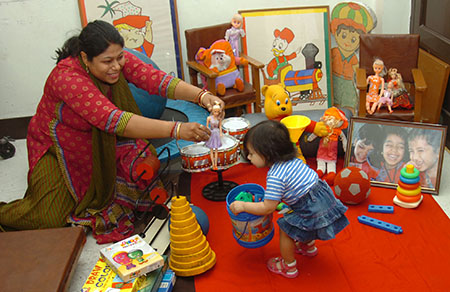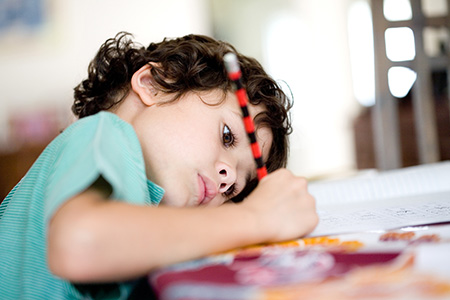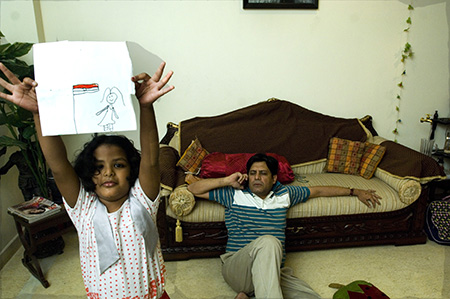Is your bundle of joy’s chubby cheeks and dimpled chin missing a smile? Parent alert: a troubled child needs help. Identify the problem and correct it
Rishi and Smita were not too concerned when their son, Rohan, 6, first stopped talking to them. But when it went on for a week, they decided to see a doctor.
“As soon as he returns from school, he locks himself in his room,” Smita said to the psychiatrist. “If we ask him something, he briefly answers yes or no. He does not eat, go out to play or study.” Simply put, Rohan was not behaving like other happy children of his age.
And, at the psychiatric clinic, the answer was found. During a play therapy session, it was revealed that Rohan’s mother and father were always fighting with each other. The doctor diagnosed Rohan with depression and showed the parents the effect their constant bickering had on their son. The parents immediately made changes in their behaviour. Three months and thirteen sessions of psychotherapy later, Rohan is back to his chirpy self, and has a happy home.
Ishaan, 7, is not so lucky. He lost his grandparents in a road accident. Immersed in their own grief, his parents didn’t realise the impact of the tragedy on the delicate child, who used to spend all his time with his dear dada and dadi. Soon, everyone had come to terms with the loss, except Ishaan.
He does not mingle with people any more and is disinterested in everything, be it his favourite Tom and Jerry show or Ben 10 video game. Even a five-day vacation in Goa, his favourite holiday spot, hasn’t helped. He is still undergoing psychotherapy.
In the last couple of years, there has been a threefold increase in the incidence of depression among children. Doctors believe that 60 per cent of all mental problems begin in childhood. Also, the age of onset of depression—the common cold in the world of mental illness—has gone down dramatically.
“Even the stomach ache or headache that your child complains of could be a symptom of depression,” says Dr Kersi Chavda, president, Psychiatric Society, Mumbai. “Earlier, it was generally adolescents in the 17-19 age-group who visited us with symptoms of depression. Now, we have children in the 5-9 age-group.” Dr Rita Roy, a Kolkata-based child psychiatrist, agrees. “Now, even four-year-olds suffer from depression,” she says. “I get at least two new cases of little children with depression each week.”
In children, depression manifests itself in strange ways, and may sometimes even be masked. Unlike adults, children are unable to describe their feelings. So, they often complain of vague pains and aches in the stomach, head and body. They become irritable and sleepy, lose their appetite and may even be violent.
How do doctors diagnose such young patients? “Even after a detailed assessment, when we cannot find any physical cause for the problem, we note the emotional history of the patient and refer the child to a child psychologist,” says Sinchita Bhattacharya, paediatrician, G.M. Modi Hospital, Delhi. Roy feels that parents begin to take notice and realise that there is something wrong with their child’s behaviour when the child is disinterested in studies.
Children with epilepsy, multiple sclerosis, Huntington’s disease, Cushing’s disease, hypothyroidism or diabetes show the same symptoms as those of depression. They are generally lethargic, complain of vague pains in the body and feel sleepy or restless. But they need medication for these diseases, rather than for depression.
Contrary to popular belief, the pressure to perform well in academics is not the sole cause of depression in children. Any unpleasant occurrence or situation, be it fights among parents, loss of dear ones or physical or sexual abuse, along with some degree of genetic predisposition, can trigger depression. “Children with physical or learning disabilities are five times more prone to depression than their normal counterparts,” says Dr Jitender Nagpal, consultant psychiatrist, Moolchand Medcity, Delhi.
Take the case of Arth. Hard to believe that the smart 15-year-old could be suffering from depression. Last year, he was expelled from school because of his bullying nature. Fun for him was pinching someone’s nose, or pushing someone down the stairs. His emotional distress was triggered when he failed class VIII.
His mother, Deepika, managed to get him admitted to class IX in another school. But complaints started flowing in. “He knows his subjects, but does not write anything in the examination papers,” says Deepika. “He laughs with me and hugs me, but does not mingle with anyone else.” The worried mother finally took him to Nagpal, who found the answer.
“Arth is dyslexic,” says Nagpal. “Because nobody understands the root cause of his bad academic performance, he gets irritable. He had lost his father at a tender age. His anger, loneliness and frustration turned him into a bully and he slowly slipped into depression.”
Psychologists say that every child who needs some extra emotional, physical or social support is a child with special needs. He may be a child with a learning disability, a physical disability or obesity, or the child of an HIV positive patient, a C student (one not too good at studies) or even the child of a single parent.
Even children of people suffering from a chronic disease are found to be at a higher risk of suffering from depression as compared to their happier counterparts. “These children are directly or indirectly discriminated against by those around them, which makes them volatile,” says Nagpal. “Any further stimulus can push them into a depressive phase.”
Siddhant Roy, 6, is cute, but slightly overweight. He has loving parents, a happy home and lots of toys. But he rarely looks happy. His parents have probed the issue and found that his classmates and friends were constantly teasing him for being plump. And his parents inadvertently complicated matters by giving him pet names like laddoo, chikoo, golu and kaddu, which Siddhant associated with obesity.
His parents mentioned this to a psychiatrist friend, who told them such seemingly harmless names can wreak havoc on a child’s delicate mind. “Today’s children are sensitive, and parents have to accept this,” says Nagpal. “They grow really fast. There is a lot of peer pressure. Such situations can be avoided by communicating with them. Even for simple things like pet names, they can be asked for preferences, likes and dislikes.”
Doctors feel that lack of communication between the child and the parents can exacerbate depression, especially in the case of teenagers. If a child feels he has not been understood by his parents, he starts feeling worthless, lonely and unwanted. “Recently, a class XI student came to me. He was very stressed that he got two marks fewer than the topper,” says Dr Arti Sasane, consultant, Fortis Hospital, Mumbai. “When such stress persists for a long time, it may lead to depression.” School-going children generally become stressed during examination time. “I was shocked to see the level of anxiety in this child,” she says. “He was worried because his mother had told him she would be visiting his teacher to find out the reason behind the drop in marks.”
Teenage is a very delicate period. There are physical and hormonal changes, and the parents’ expectations are high, as is academic pressure, and the level of communication with parents drops. “Ten per cent teenage boys and 20 per cent teenage girls suffer from depression,” says Samsah Soonawala, associate director of psychiatry research, Jaslok Hospital, Mumbai. “A teenager is in a confused state. At this age, he needs maximum support and, unfortunately, he receives the minimum.”



